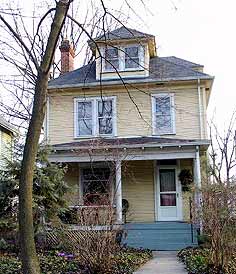
 |
||||||




Q. I was told I would have to get a "Certificate of Appropriateness" from our historic preservation commission before starting exterior work on my house. What is the certificate, and what should I do?
A. Some local communities—historic districts—have preservation ordinances requiring that proposed work on designated historic properties be reviewed by a local historic preservation commission or design review board. These commissions and boards are comprised of local citizens appointed by the city government. Generally, when they review and approve proposed changes to a historic building they issue a “Certificate of Appropriateness.” A Certificate of Appropriateness is simply a document stating that the proposed work is appropriate for the historic district and meets criteria in the local code. Usually, the certificate is required before most exterior work begins and before a building permit can be issued. Work completed without a Certificate of Appropriateness creates a legal risk of fines and having to reverse any work done for failing to follow procedures.
You need to contact your city government’s preservation official
for specific information about what is needed for a Certificate of Appropriateness,
the design review process, and to obtain an application for proposed exterior
work. The completed application is submitted to the city’s preservation
official, who forwards it to the historic preservation commission or design
review board. Property owners usually attend the commission’s regularly
scheduled public meeting to present their work proposal and answer any
questions the commission or other citizens in the community may have about
it. The commission discusses the project, measures it against criteria
in the code, then votes on the proposal. If approved, the applicant receives
the “Certificate of Appropriateness” in the mail. If denied,
the applicant has an opportunity to make changes to the proposal and re-submit
it. For a particularly complex construction project, the citizen commission
or board may consult with the State Historic Preservation Office, but
its review and decision is completely independent of the State.
---------------------------------